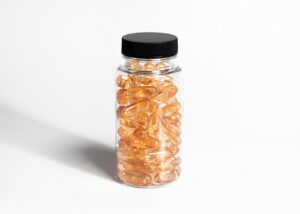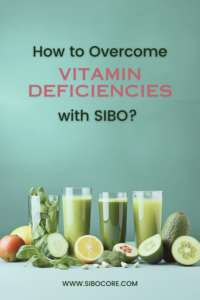Vitamin deficiencies are a common struggle for those with SIBO (Small Intestinal Bacterial Overgrowth), and they can impact energy levels, mood, and even immune function. Did you know that SIBO can interfere with your body’s ability to absorb critical nutrients, including B12, vitamin D, and others essential for optimal health? In this guide, we’ll dive deep into the vitamins most affected by SIBO, why these deficiencies occur, and how you can address them to feel your best. Whether you’re managing SIBO yourself or supporting someone who is, understanding these deficiencies can be a game-changer for health and recovery!
When my SIBO was diagnosed, the doctor tested me for vitamin & mineral deficiencies too. She surprised me by confirming I had not one but 10 severe deficiencies! No wonder I was feeling horrible everyday. It wasn’t just the SIBO affecting me directly (with bloating and bubbling pain after eating), but indirectly too by messing with my nutrient absorption. All of those deficiencies caused their own set of problems and I cannot tell you how much better I felt after I’d started supplementing. Let’s dive in to see if this might be your case too.

Why Does SIBO Cause Vitamin Deficiencies?
SIBO, or Small Intestinal Bacterial Overgrowth, doesn’t just disrupt digestion—it also affects how well your body absorbs essential nutrients. Here’s how SIBO causes nutrient malabsorption:
-
Bacteria Compete for Nutrients: In SIBO, excess bacteria in the small intestine consume nutrients like vitamins before your body can absorb them. This competition often leads to deficiencies in vitamins like B12, D, and other nutrients crucial for energy and immunity.
In short: bacteria eat your food before you have a chance to digest them!
You’re starving even though you might be eating well. Personally, I never felt energised after food during all of my 12 long years battling SIBO. It wasn’t until after I had fixed SIBO + my vitamin shortages that I started to understand why people had energy after eating. -
Disrupts Fat Absorption: SIBO commonly leads to fat malabsorption. When fats aren’t properly absorbed, the body misses out on fat-soluble vitamins like A, E, D, and K. These vitamins are essential for skin, vision, immune function, and blood clotting.
-
Damages the Gut Lining: The bacterial overgrowth can also harm the gut lining, making it harder for nutrients to pass through into your bloodstream. This further reduces the body’s ability to absorb vitamins and minerals effectively.
-
Causes Inflammation: SIBO often triggers inflammation in the gut, which disrupts the digestion and absorption process even more. This inflammation can worsen nutrient losses over time, leading to symptoms like fatigue, brain fog, and weakened immunity.
Vitamin B12 (Cobalamin)
Vitamin B12 is essential for energy, brain function, and nerve health, but people with SIBO often struggle with low B12 levels as one of the main vitamin deficiencies.
Symptoms of B12 Deficiency in SIBO
- Fatigue and Low Energy: Persistent tiredness and lack of energy.
- Brain Fog: Difficulty focusing, forgetfulness, and mental cloudiness.
- Numbness or Tingling: Sensations in hands and feet from impacted nerve health.
- Mood Changes: Irritability, mood swings, and sometimes depression.
Why SIBO Leads to B12 Deficiency
- Bacterial Competition: Excess bacteria in the small intestine consume B12 before your body can absorb it, resulting in lower levels.
- Impaired Absorption: SIBO can reduce intrinsic factor production, which is needed for B12 absorption. Intrinsic factor (IF) is a protein made in the stomach that binds to vitamin B12, allowing it to be absorbed in the small intestine and used by the body.
- Gut Lining Damage: SIBO can harm the gut lining where B12 is absorbed, further limiting its entry into the bloodstream.
How to Address B12 Deficiency
- B12-Rich Foods: Include foods like fish, meat, and dairy.
Vegetarians and vegans should be especially careful to ensure you get enough B12, because it’s a common deficiency in those restricting meat. I unfortunately learned this the hard way and am now extra careful to supplement it. - B12 Supplements: Oral supplements can be used. For strong deficiencies, a healthcare provider might recommend injections instead.

Why Does SIBO Cause Vitamin D Deficiency?
Vitamin D is essential for immune support, mood balance, and bone strength, but a vitamin D deficiency is common in people with SIBO. Here’s why SIBO affects vitamin D levels, key symptoms to look for, and ways to treat it.
Symptoms of Vitamin D Deficiency in SIBO
- Frequent Illnesses: Vitamin D deficiency weakens the immune system, making infections and colds more frequent.
- Mood Swings and Fatigue: Low vitamin D can lead to mood changes, fatigue, and even depression.
- Bone Pain and Muscle Weakness: Vitamin D is vital for strong bones; low levels can cause joint pain, muscle aches, and weakness.
How SIBO Leads to Vitamin D Deficiency
- Fat Malabsorption in SIBO: Vitamin D is a fat-soluble vitamin, requiring fat for proper absorption. SIBO often leads to fat malabsorption, making it harder for your body to absorb vitamin D from food sources. One of the things that might cause fat malabsorption is: reduced bile flow. SIBO can interfere with bile production, which is essential for breaking down fats. Without enough bile, vitamin D absorption is limited.
- Gut Inflammation: SIBO often increases inflammation in the small intestine, further disrupting the absorption of fats and fat-soluble vitamins like vitamin D.
Treating Vitamin D Deficiency in SIBO
- Sun Exposure for Natural Vitamin D: Many people know that regular sun exposure helps your body produce vitamin D, which can supplement dietary intake. So go for nice walks outside regularly. This has a bonus that it also is an immediate mood booster. (At least for me it always is, but that might be because I live in a cold country.)
- Foods Rich in Vitamin D. Many people know that sun is good for vitamin D, but did you know it can also be found in food? It can be found in fatty fish, egg yolks, and fortified dairy products.
-
Vitamin D Supplements: Supplements, especially vitamin D3, may also help to restore levels in those with SIBO. In my country it’s common knowledge that everybody needs to take vitamin D supplements in winter, because it’s such a common deficiency.
Why Does SIBO Cause Deficiencies in Essential Vitamins A, E, and K?
If you’re dealing with SIBO, you may also be low on vitamins A, E, and K. These vitamins are crucial for vision, immune health, and blood clotting. Let’s break down why SIBO affects these vitamins, the signs of deficiency, and ways to restore your levels.
Symptoms of Deficiencies in Vitamins A, E, and K
-
Vitamin A:
- Poor Night Vision: Struggling to see in dim light could signal low vitamin A.
- Skin & Immunity Issues: Dry, flaky skin and frequent colds or infections may point to a deficiency.
- Vitamin E:
- Nerve Problems: Tingling in your hands and feet? It could be a sign of low vitamin E.
- Frequent Illnesses: Vitamin E supports your immune system, so being sick often may mean you’re not getting enough.
- Vitamin K:
- Easy Bruising: If you bruise or bleed easily, low vitamin K may be the reason.
- Weak Bones: Vitamin K directs calcium to your bones, so low levels can lead to bone weakness.
Why SIBO Leads to Deficiencies in These Vitamins?
- Gut Bacteria Disruption: Normally, your gut bacteria help produce vitamin K, but SIBO’s bacterial imbalance can reduce this production, leading to a shortage.
- Inflamed Gut Lining: SIBO often irritates and inflames the gut lining, which makes it harder to absorb vitamins A and E that are crucial for skin, eye health, and immune function.
- Unstable Nutrient Environment: With SIBO, the gut environment becomes less stable, making vitamins like A and E harder for your body to absorb and use.
How to Restore Your Vitamin Levels?
-
What foods to eat more of?
- Vitamin A: Found in carrots, sweet potatoes, and leafy greens.
- Vitamin E: Found in nuts, seeds, and spinach.
- Vitamin K: Abundant in leafy greens like kale and broccoli.
-
Targeted Supplements: Supplements for vitamins A, E, and K can be effective.

Why Does SIBO Cause Magnesium and Iron Deficiencies?
If you have SIBO, you might also struggle with low magnesium and iron levels on top of other vitamin deficiencies. These minerals are essential for energy, muscle function, and oxygen flow throughout the body. Here’s why SIBO impacts magnesium and iron absorption, symptoms to watch for, and how to improve your levels.
Common Symptoms of Magnesium and Iron Deficiencies in SIBO
-
Magnesium:
- Frequent Muscle Cramps: Tightness, cramps, or muscle twitches may signal a magnesium shortage.
- Anxiety and Poor Sleep: Magnesium helps with relaxation, so low levels can lead to stress, anxious feelings, and sleep trouble.
-
Iron:
- Fatigue and Weakness: Constant tiredness and low stamina, even with enough sleep, are common symptoms of low iron.
- Pale Skin and Brittle Nails: Pale skin, brittle nails, or cold hands and feet can also indicate iron deficiency. I had always been a pale person, but the past couple of years I had been walking around so pale that people commonly asked me if I was ill. I always laughed it off, but little did I know that that was true!
Why SIBO Leads to Magnesium and Iron Deficiencies?
-
Bacteria Compete for Iron: The bacterial overgrowth in SIBO uses up available iron, often leaving too little for your body to absorb and use, leading to iron deficiency even when iron-rich foods are in your diet.
-
Inflammation Disrupts Magnesium Absorption: SIBO often causes inflammation in the small intestine, which directly interferes with magnesium absorption, reducing the body’s ability to maintain healthy magnesium levels.
-
Reduced Stomach Acid Affects Iron Uptake: Iron absorption depends on stomach acid, but SIBO can lower acid levels, making it harder for your body to absorb iron effectively.
How to Restore Magnesium and Iron Levels?
- Add Foods High in Magnesium and Iron:
-
- Magnesium: Leafy greens, nuts, seeds, and whole grains are great sources.
- Iron: Include red meat, poultry, beans, and dark leafy greens to boost iron intake.
-
- Consider Magnesium and Iron Supplements: Supplements can help replenish low levels. Magnesium glycinate is gentle on the stomach, and a healthcare provider can recommend the right iron supplement and dosage to avoid digestive upset.
-
Support Gut Health for Better Absorption: Enhancing gut health with probiotics, digestive enzymes, and anti-inflammatory foods can help your body absorb magnesium and iron more effectively.
You suspect one or more of these deficiencies, what now?
Supplementing vitamins for SIBO can be a game-changer, but safety is key—especially with vitamins that build up in the body. Here’s what to do to safely boost your nutrients while managing SIBO and vitamin deficiencies.
1. Start with the Right Dosages
- Consult a Healthcare Provider: Always check with your doctor to find the best dose for your needs, especially for fat-soluble vitamins like A, D, E, and K, which can build up if overused.
- Follow Supplement Labels Carefully: Stick to the recommended doses on the label unless your provider advises otherwise.
2. Choose High-Quality Supplements
- Opt for Trusted Brands: Look for third-party-tested supplements to ensure they’re pure and potent.
- Focus on Specific Nutrients: Target the vitamins you’re low in (like B12, D, or magnesium) rather than taking high-dose multivitamins, which could lead to unnecessary excess.
3. Monitor Your Vitamin Levels
- Schedule Regular Check-Ups: Blood tests can help track your vitamin levels and ensure you’re absorbing nutrients safely and effectively.
- Watch for Improvement: Track any changes in symptoms to see how your body is responding to the vitamins, making adjustments as needed.
4. Balance Supplements with a Nutrient-Rich Diet
- Eat Nutrient-Dense Foods: A balanced diet helps keep nutrient intake natural and safe. Foods like leafy greens, eggs, nuts, and lean meats provide essential vitamins that complement your supplements.
- Follow a SIBO-Friendly Diet: Focus on foods that support gut health, reduce inflammation, and boost nutrient absorption.
A word of caution about Low FODMAP
Like many of you, I was pushed towards a low FODMAP diet while my doctors still thought I had Irritable Bowel Syndrome (IBS). While the diet did help me (and many others) in managing my symptoms in some ways, it is very restrictive and should only be used for short periods of time. After the first few months I figured out that basically all FODMAPs were triggering me, so I kept following the diet. Any food I put in my mouth gave me symptoms, so I tried to avoid everything: it worsened my vitamin intake for sure!
Learn from my mistake and don’t do that. While it is frustrating to not be able to eat properly and the diet might give some relief, please focus on finding the root cause of SIBO and focus on that and general gut health.

Lifestyle Tips to Support Vitamin Absorption in SIBO
In addition to diet and supplements, certain lifestyle habits can make a big difference in vitamin absorption and overall SIBO management. Here are some practical tips to improve nutrient intake, reduce SIBO vitamin deficiencies and support gut health.
1. Manage Stress Levels
- Stress Reduction Techniques: Chronic stress can worsen gut health and nutrient absorption. Practice stress-relieving activities like deep breathing, meditation, yoga, or gentle exercise.
- Prioritize Sleep: Quality sleep supports digestion and allows the body to repair and absorb nutrients more effectively.
2. Practice Mindful Eating
- Chew Thoroughly: Properly chewing food helps break it down, making nutrients easier for the body to absorb.
- Avoid Rushed Eating: Eating slowly and mindfully allows your digestive system to work at its best, supporting nutrient breakdown and absorption.
3. Stay Hydrated
- Water Aids Digestion: Staying hydrated helps your digestive system process nutrients more efficiently. Aim to drink water throughout the day, but avoid large amounts right before or during meals, which can dilute digestive enzymes. I like to track how much I drink using a smartwatch and my bottle has helpful amounts written on it to push me to drink more.
4. Include Physical Activity
- Gentle Exercise for Digestive Health: Regular, moderate exercise like walking, yoga, or stretching can stimulate digestion, improve blood flow, and help the body absorb nutrients better.
- Avoid Intense Workouts if Symptomatic: Overly strenuous exercise can worsen SIBO symptoms, so stick to gentle activities that don’t strain the gut.
5. Maintain a Consistent Eating Schedule
- Regular Meal Times: Eating at consistent times helps regulate digestion and absorption, allowing your gut to process nutrients more effectively.
- Avoid Late-Night Eating: Eating too close to bedtime can disrupt digestion, so try to have your last meal a few hours before sleeping.
Conclusion: Empowering Your Health While Managing SIBO Vitamin Deficiencies
Overcoming vitamin deficiencies with SIBO is achievable, I can know, because I went through the process myself. But it will take time and a combination of targeted supplements, a nutrient-packed diet, and gut-friendly lifestyle habits. Working with a doctor will help to ensure you’re on the right track.


